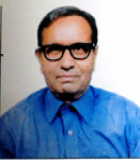Creation and Criticism
ISSN: 2455-9687
(A Quarterly International Peer-reviewed Refereed e-Journal
Devoted to English Language and Literature)
Vol. 07, Joint Issue 24 & 25: Jan-April 2022

Critique
Poetry of Compassion from Rajasthan
H. S. Chandalia
Songs of Rajasthan and Other Poems (2020) and The Songs of India and the World (2019) published by Prakash Book Depot , Bareilly are two slim books of poems composed by a veteran teacher of English Literature and English Language. Having taught for an exceptionally long period of fifty five years in different colleges and universities of India and abroad the poet Sagar Mal Gupta has all credentials of a master of his craft and needs little introduction as a scholar. From his first book in which he talks of “India and the World” to his second book in which he talks of “Rajasthan” he gathers an image of a global toddler or a vagabond who has a lot of curiosity which he attempts to satisfy through his journeys, physical and otherwise. Rooted in his land, he wants to travel around the world in search of new experiences which he may pen down in his artistic verses.
The poetry of Prof. Gupta is a creation of an individual who is conscious of his duties as a poet and as a citizen. A poet has to give a clarion call to his people. The need of a revolution was never felt so badly as it is being felt now. He knows people will not slumber for long. The immense collective power of the masses just needs to be awakened. “People are Getting Up” is one such small poem that may be mentioned here: The Huge, hefty elephant/ tied to a stake/ with a small rope/ dances to the tune of the ring master./ When aware of his sleeping strength/ breaks loose/ and kicks a rebellion (The Songs of India and the World 72).
It is interesting to note that Indian poets writing in English in 20th and even 21st century still draw their inspiration more from the British romantic poets than from the contemporary poets. Gupta writes in the preface to the book The Songs of India and the World, “ Following Keats’s ‘Ode on a Grecian Urn’, I have built one image upon another in the poem ‘Paintings in a Salt Field’.”(iv) In the same place he remembers Walt Whitman also and states that one of his poems is written using a technique found in Whitman’s poetry. The first poem of the collection The Songs of India and the World titled ‘India’s Identity’ seems sarcastic but does not carry the message of India’s identity. India is a country with such diverse cultures and life styles that an urban snapshot at a crossroad can barely qualify to be a representative picture of India’s identity. However, this is not the representative poem of the collection too. The next poem “Wall of Tears” could be considered more representative of Gupta’s poetry.
What is typical of the poems in this collection is their descriptive nature. Poems like ‘On Tordi Village in Rajasthan’, ‘A Ubiquitous Mobile Phone’, ‘Jaisalmer Desert Festival, ‘On Knife Day’, ‘A Tribute to Jadavpur University’ are full of descriptive prose passages divided into lines of varied length but without that rhyme or rhythm that creates melody. The poems that carry reflections and messages are real strength of this collection. The poem ‘First Wound’ has some memorable lines: “ Said that love at first sight/ never dies/ it stays/ lingers on/ even after subsequent lovers/ and/or husbands.”(63) “ Who is Superior” is a poem that builds up an argument through a dialogue between a mother and her child. The poem reminds one of a poem “ The Immortal Friend” by J.Krishnamurthy published in a A Golden Treasury of Indo-Anglian Poetry edited by V.K.Gokak and Published by Sahitya Academy, New Delhi.
The second collection of poems namely Songs of Rajasthan and Other Poems (2020) contains nearly ninety poems. These poems are also written on a variety of themes including places, people, events, individual and human concerns and finally the pandemic. In the preface of the book Prof. Gupta tries to clarify his use of the word “ Songs” in the title : “ The word ‘song’ literally means a composition that is sung to the accompaniment of a musical instrument. But here the word has been used in a general sense that is a creation that has the rhythm of feelings , emotions and sentiments, the rhythm of meaning and the rhythm of figures of speech and new and startling expressions.” Towards the end of the preface he declares his objective of composing poetry. He states, “ What kind of poetry do I write? I would say I write on nature, society, sensitivity, literature festivals, and cultural festivals, famous monuments in Rajasthan and in the world. I also raise my voice against the suffering and pain of migrant workers.”The statement makes it very clear that the poet has a wide range of concerns and contexts of his poems. This variety has been derived from his vast experience earned through travel and observation.
The collection begins with a poem titled “ Ranthambore”. This sanctuary is an attraction of people from all over the world. It is known for its tigers and the dense forests that are a home to these wild cats. The chirping of birds “singing merrily in full throated ease” reminds one of the famous line of romantic poetry with which almost every student of English Literature is in love. ‘A City of Monuments’ is like a guided tour of Jaipur with which the poet is in deep love as it is a place of his residence. The movement of sand dunes during night blown away by wind is portrayed poetically in the lines, “ The darling wind that blew the whole night/ lifted her in arms and placed her/ fifty feet away on a more comfortable location.”( Songs of Rajasthan and Other Poems 27) The poem titled Hagia Sophia presents a noble view of buildings in a time which is so much polluted by religious hatred. The opening lines are very important: “ Buildings are secular like flowers/ trees, mountains, rivers and oceans/ A building used as a house / a church, a mosque, a temple or a synagogue.”( 50) There are many poems on Covid-19 which record the pathetic state of people in this pandemic. Prof. Gupta has recorded this human tragedy in very moving verses.
Both the books have been beautifully printed and decorated by eye catching illustrations on the cover. The price too is pretty affordable which will surely enable poetry lovers to buy such books. It is good that after Prof. I.K.Sharma the poems of Prof. Sagar Mal Gupta have represented Rajasthan in the galaxy of Indian poets in English.
Works Cited:
Gupta, Sagar Mal. The Songs of India and Abroad. Prakash Book Depot, Bareilly, 2019.
Gupta, Sagar Mal. The Songs of Rajasthan and Other Poems. Prakash Book Depot, Bareilly, 2020.
About the Author:
 Dr. Hemendra Singh Chandalia is a Professor of English at Janardan Rai Nagar Rajasthan Vidyapeeth (University).He has seventeen books and about thirty five research papers to his credit. Three collections of his poems namely Safar Se Purv (1991),Sirf Swapna Nahin hei Sonchirayya(1998) and Mein Tumhe Bhula Kahan hun Mahasaagar(2014)have been published. His major books include Script to Screen : The Progressive Vision of Khwaja Ahmad Abbas (2014), Tribal Literature , Culture and Knowledge Systems ( 2018) and Killing Gandhi, Living Gandhi ( 2020). Two works of translation namely Swatantrata Sangraam mein Bheetarghaat ( from English to Hindi) and Obeisance through Body, Obeisance through Mind(From Hindi to English) are also published. In March, 2017 he was appointed as the President of India’s Nominee in the Court of Banaras Hindu University for a term of three years. Prof. Chandalia has visited Sri Lanka, Peoples Republic of China and Thailand in pursuance of his academic interest. He can be contacted at hemchandalia@gmail.com
Dr. Hemendra Singh Chandalia is a Professor of English at Janardan Rai Nagar Rajasthan Vidyapeeth (University).He has seventeen books and about thirty five research papers to his credit. Three collections of his poems namely Safar Se Purv (1991),Sirf Swapna Nahin hei Sonchirayya(1998) and Mein Tumhe Bhula Kahan hun Mahasaagar(2014)have been published. His major books include Script to Screen : The Progressive Vision of Khwaja Ahmad Abbas (2014), Tribal Literature , Culture and Knowledge Systems ( 2018) and Killing Gandhi, Living Gandhi ( 2020). Two works of translation namely Swatantrata Sangraam mein Bheetarghaat ( from English to Hindi) and Obeisance through Body, Obeisance through Mind(From Hindi to English) are also published. In March, 2017 he was appointed as the President of India’s Nominee in the Court of Banaras Hindu University for a term of three years. Prof. Chandalia has visited Sri Lanka, Peoples Republic of China and Thailand in pursuance of his academic interest. He can be contacted at hemchandalia@gmail.com


